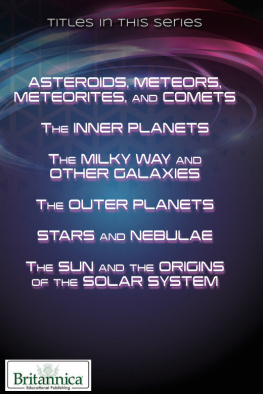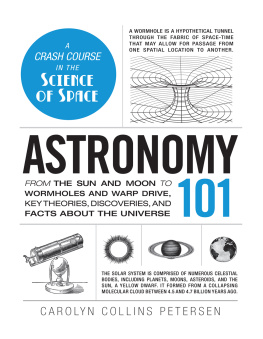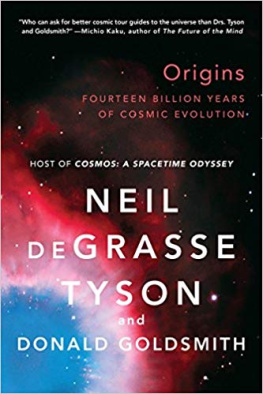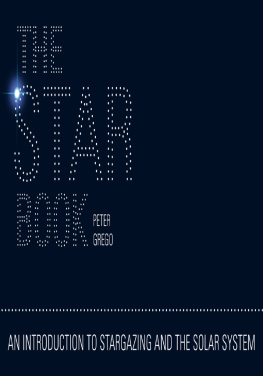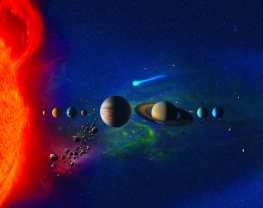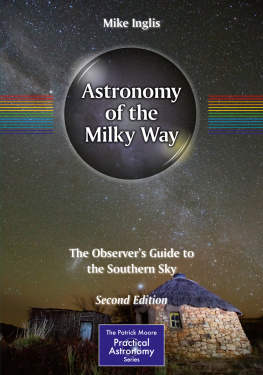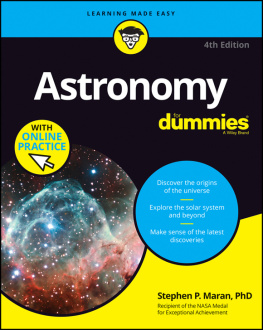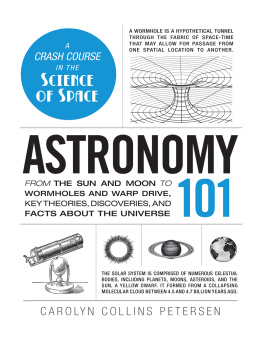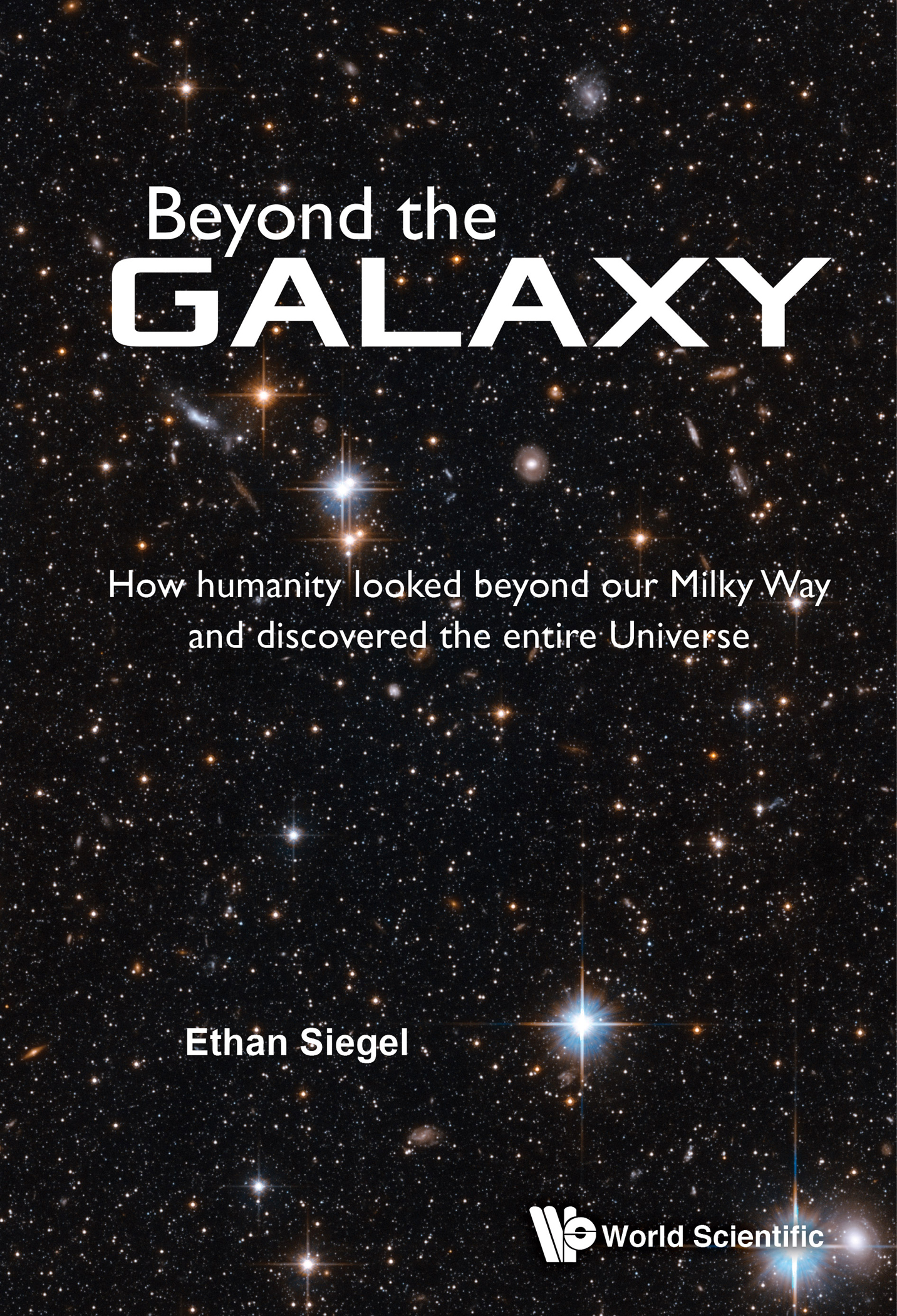Table of Contents
Pagebreaks of the print version
Beyond the
GALAXY
How humanity looked beyond our Milky Way
and discovered the entire Universe
Beyond the
GALAXY
How humanity looked beyond our Milky Way
and discovered the entire Universe
Ethan Siegel
Lewis & Clark College, USA

Published by
World Scientific Publishing Co. Pte. Ltd.
5 Toh Tuck Link, Singapore 596224
USA office: 27 Warren Street, Suite 401-402, Hackensack, NJ 07601
UK office: 57 Shelton Street, Covent Garden, London WC2H 9HE
Library of Congress Cataloging-in-Publication Data
Siegel, Ethan, 1978 author.
Beyond the galaxy : how humanity looked beyond our milky way and discovered the entire universe / Ethan Siegel (Lewis & Clark College).
pages cm
Includes index.
ISBN 978-9814667234 (hardcover : alk. paper) -- ISBN 978-9814667166 (softcover : alk. paper) 1. Expanding universe. 2. Astronomy. 3. Astrophysics. 4. Cosmology. I. Title.
QB991.E94S54 2015
523.1--dc23
2015003689
British Library Cataloguing-in-Publication Data
A catalogue record for this book is available from the British Library.
Cover image credit: NASA, ESA and T.M. Brown (STScI).
Copyright 2016 by World Scientific Publishing Co. Pte. Ltd.
All rights reserved. This book, or parts thereof, may not be reproduced in any form or by any means, electronic or mechanical, including photocopying, recording or any information storage and retrieval system now known or to be invented, without written permission from the publisher.
For photocopying of material in this volume, please pay a copying fee through the Copyright Clearance Center, Inc., 222 Rosewood Drive, Danvers, MA 01923, USA. In this case permission to photocopy is not required from the publisher.
In-house Editor: Ng Kah Fee
Typeset by Stallion Press
Email:
Printed in Singapore
Preface
When I received my class schedule in my first year as a college professor in 2009, I was overjoyed to learn I would be teaching our colleges introductory astronomy class. I had remembered learning the story of the Universe in bits and pieces from a young age up through my Ph.D. studies and beyond, and being fascinated at every turn to learn the story of what the Universe was and how it came to be this way. At every level, greater details were filled in, old ideas were shown to be only approximations of a deeper truth about reality, and our knowledge of the Universe was constantly being refined with higher precision measurements and in the context of new results. The story of what we knew of our place in the Universe and how we came to know it was one I could not wait to share with my students.
Yet, when it came time to choose a textbook for the class, a book that told that story was not an option. That book, to my surprise, did not exist. The major astronomy textbooks that were out there were incredibly comprehensive works, teaching all about astronomical techniques, instruments, various aspects of planets, stars and galaxies, multiwavelength analyses and more. They may prove to be excellent resources for someone seeking to become a professional astronomer, laying an impressive foundation for someone who had not taken a course devoted to the endeavor before. Despite being instructive guides for students who were learning to solve a wide variety of classes of problems in astronomy, there was something that was sorely lacking from them all: that story of what we know and how we came to know it.
The reality was, on a non-textbook front, there were not even any scientifically accurate books that adequately covered this story. Your best option is to get a graduate-level text to learn about the full suite of the latest developments, curate out the heavy-lifting of the equations, and augment the more basic material with popular science books. In the end, though, what you are dealing with is an amalgam of dissatisfying options, none of which simply lay out the story of what the Universe is and how we have discovered it to be so.
Which, to my mind, really misses the point of what a first course in astronomy should be all about! Yes, a very small percentage of the people who take that course will go on to become professional astronomers, but the vast majority who take an interest in it are craving an awareness of the great cosmic story that we all share. I was not nearly as interested in what types of problems a student would be able to solve on an exam after three or four months of study as I was in what they would remember and appreciate about not only the Universe, but of the process and the enterprise of science, a year, five or even ten down the road. I wanted to begin from a place where they were totally comfortable from the simplest, naked-eye observations here on Earth and take them right up to the frontiers of modern scientific knowledge.
That story, the scientific story of what we know of the Universe and how we have come to know it, is one thats evolved tremendously in just the past century. As I complete the writing of this book at the end of 2014, I look back and realize that just 100 years ago, the leading physicists and astronomers of the day believed that the entire Universe consisted of the Milky Way galaxy and all the stars in it, was static and eternal, and was governed by Newtons law of gravitation. How times have changed, and how rapidly! We now know we live in a vast Universe containing hundreds of billions of galaxies, a Universe which is expanding and cooling, governed by Einsteins General Relativity, and that actually had a birthday some 13.8 billion years ago: the Big Bang. We know that the Big Bang was not the very beginning, either; there was a phase before it known as cosmic inflation. And the vast majority of the matter we know, made of protons, neutrons and electrons just like we are, makes up only 5% of the total amount of energy in the Universe. There are unseen forms of matter and energy, dark matter and dark energy, that have come to dominate our Universe today. On top of all that, we have actually learned the fate of our Universe and what our far future is going to look like.
Why is this not the story that everyone interested in astronomy learns about our Universe? And why do we not learn how we came to learn these things? Even those who major in physics or astronomy at many colleges miss out on this!
This book was written with the intention of correcting all of that. Whether you are learning about the Universe for the first time, taking an introductory course or looking for the latest update on modern developments in the story of what we know about the Universe and how weve come to know it, this book is designed to start at the very beginning of human exploration and take you through the most important developments that led to our present understanding of all there is. There are no problems to be solved or worked out, no formulas and no equations (except an occasional mention of E = mc2), and any mathematical or physical relationships that are mentioned are described in plain English.
This is the story that is universal to us all, the story that the Universe tells us about itself. We learned it simply by looking at it and asking it the right questions, and if all of human knowledge were lost tomorrow, we could find it out again at any instant if we asked those questions once again. I hope you enjoy the journey into what we know about the Universe, and come to appreciate the great cosmic story universal to us all.


